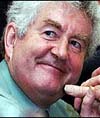
| Rhodri Morgan
Hywel Rhodri Morgan (born 29 September 1939) is a Welsh politician and the second and current First Minister for Wales. He was born in Cardiff, the son of Professor T. J. Morgan, and educated at Whitchurch Grammar School, St John's College, Oxford and Harvard University. His brother is the eminent historian, Prys Morgan. Rhodri Morgan worked for South Glamorgan County Council from 1974 to 1980 before becoming head of the European Community's office in Wales. He was elected as Labour MP for Cardiff West in 1987. From 1988 to 1994, he was a Shadow Environment Spokesman. He was also Chairman of the House of Commons Select Committee on Public Administration (1997-1999), and Opposition Front Bench Spokesman on Energy (1988-92) and Welsh Affairs (1992-1997). He became First Minister on 16 October 2000, having held the same post under its old title of "First Secretary" since February of that year. He was appointed to the Privy Council in July 2000.
A committed supporter of Welsh devolution, Morgan contested the position of Labour's nominee for the (then titled) First Secretary of the Welsh Assembly. He lost to the then Secretary of State for Wales, Ron Davies. Davies was then forced to resign his position after an alleged sex scandal, whereupon Morgan again ran for the post. His opponent, Alun Michael, the new Secretary of State for Wales, was seen as a reluctant participant despite also having a long-standing commitment to Welsh devolution, and was widely regarded as being the choice of the UK leadership of the Labour Party.
Michael was duly elected to the leadership but resigned a little more than a year later, amid threats of an imminent no-confidence vote and widespread plotting against him by members of not only his own party, but also Assembly groups and Cabinet members. Rhodri Morgan was elected as the new Labour nominee, and thus First Minister. He stepped down from the British House of Commons at the 2001 General Election.
Morgan's leadership has been characterised by a willingness to distance himself from a number of aspects of UK Labour party policy, particularly in relation to plans to introduce choice and competition into public services, which he has argued do not fit Welsh attitudes and values, and would not work effectively in a smaller and more rural country. In a speech given in Swansea to the National Centre for Public Policy in November 2002, Morgan stated his opposition to foundation hospitals (a UK Labour proposal), and referred to the "clear red water" separating policies in Wales and in Westminster.
Welsh Labour has instead favoured a relatively conservative approach to managing public services, emphasising central co-ordination and collaboration between public service providers. Critics of this type of approach, like Julian Le Grand, argue that it offers weak incentives for providers to respond to the needs of service users.
On 1 May 2003, Labour under Morgan's leadership was re-elected in the Assembly elections. Morgan managed to win enough seats to form a Labour-only administration (the election was held under proportional representation, and Labour won 30 of the 60 seats in the Assembly and the overall majority was achieved when Dafydd Elis-Thomas AM was elected Presiding Officer of the Assembly) and named his cabinet on May 9. In that election, Labour easily took back all of the former strongholds they lost to Plaid Cymru at the height of Alun Michael's unpopularity in 1999.
Rhodri Morgan's pastimes include reading and leisurely driving around the Cardiff Bay area meeting his constituents. His wife, Julie, is the Labour MP for Cardiff North. The couple live in Michaelston-le-Pit, and are supporters of the British Humanist Association.
|
